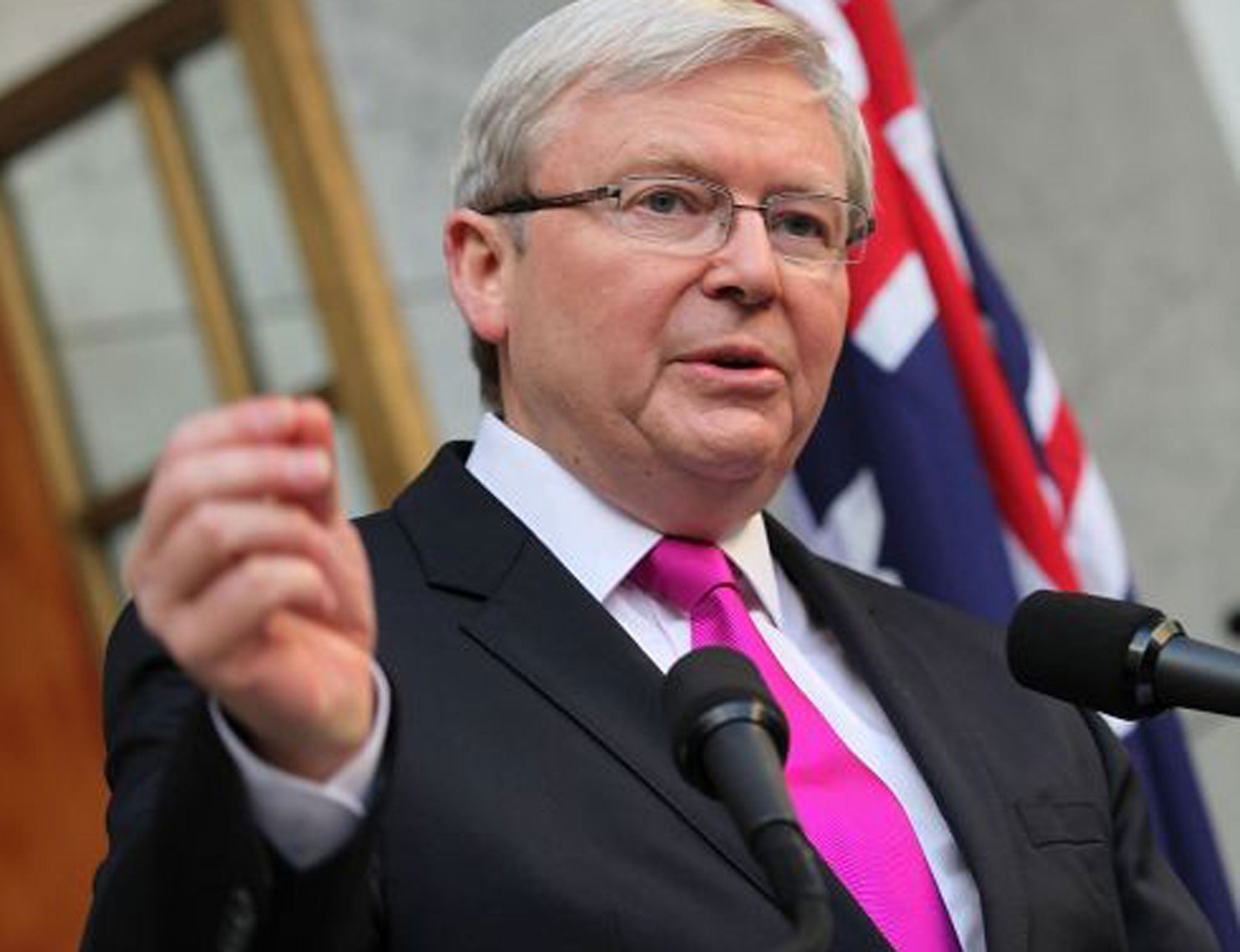Rudd calls Australia to the polls in wake of dramatic restoration
Australia’s leader seeks fresh mandate after Gillard ouster

Voters will finally get their chance to deliver a verdict on one of the most bizarre and tumultuous periods in Australian political history, after prime minister Kevin Rudd today announced that a federal election will be held on 7 September.
Ending weeks of speculation about the date, Mr Rudd (pictured) said the election would be about whom Australians trusted to “chart a course through the choppy economic waters that lie ahead”. He contrasted his “positive plans” with what he called the “wall-to-wall negativity” and “old politics of division” of the conservative Coalition.
The past three years have been a turbulent time for Mr Rudd’s Labor Party, which has been in power since 2007. In June 2010, he was dumped by the party, and replaced by his deputy, Julia Gillard, who became the nation’s first female leader. She called an election, which resulted in the first hung parliament for nearly 70 years, with Ms Gillard cobbling together a minority government supported by the Greens and several independents.
Five weeks ago, amid dreadful poll ratings, she, too, was dumped, and Mr Rudd stepped back into his old shoes. Since then, Labor’s fortunes have surged – but possibly not enough to win the election. Although he is personally far more popular than the opposition leader, Tony Abbott, the latest poll – in today’s The Australian – puts the Coalition on 52 per cent, four points ahead of Labor.
That, though, is a huge improvement for Labor, which under Ms Gillard had been heading for a defeat of historic proportions. Mr Rudd’s return boosted the party’s ratings by five to seven points almost overnight, turning the election into a contest.
In a speech outside Parliament House in Canberra today, Mr Rudd – wearing a sober dark suit and crimson tie – alluded to the extraordinary twists and turns of recent years. “You, the Australian people … have seen me at my highest highs, and some of my lowest lows,” he said.
Those moments – which included him weeping during his farewell speech after being deposed by Ms Gillard – had “certainly made me a much stronger person”, he said. “I think, as a result, you, the Australian people, know me pretty well, warts and all.” He admitted that his government had made mistakes. “The key is to learn from experience.”
At a separate press conference, Mr Abbott declared that the election would be about “who is more fair dinkum [genuine]”. He asked: “Who can you rely on to build a better future? The people who have been stable and consistent for the last three years, or a government which has been wracked by division and dysfunction, and which promises more of the same if it’s re-elected?”
During the five weeks since he was reinstated, Mr Rudd has sought to address every issue damaging to Labor. He announced a tough new policy on boat people, who will be sent to Papua New Guinea or Nauru to be processed and then, if their asylum claims are upheld, wil lbe resettled in those countries – not in Australia.
He scrapped the hated “carbon tax”, which was designed to tax the biggest polluting companies, but which voters saw as adding to their cost of living. He suspended the party’s scandal-ridden New South Wales branch, and changed rules to ensure that leaders cannot be removed so easily.
Yesterday, he reminded Australians that their country was almost unique among developed nations in having avoided a recession in recent years. Instead, nearly a million jobs had been created. Mr Abbott retorted that under Labor the budget deficit was growing by A$3bn (£1.75bn) a week.
KEY POLICY BATTLES
ASYLUM-SEEKERS
- Labor will send “boat people” to Papua New Guinea or Nauru, where they will be processed and resettled.
- The Coalition will turn back boats which enter Australian waters, if feasible to do so safely, and appoint a three-star military commander to oversee a taskforce.
CLIMATE CHANGE
- Labor will axe a fixed carbon price and move to an Emissions Trading Scheme next year.
- The Coalition’s policy – apart from abolishing the carbon tax, which Labor has pre-empted – is vague. Like Labor, it supports cutting emissions by 5 per cent by 2020.
THE ECONOMY
- Labor will pursue a “national competitiveness agenda” to broaden the economic base, now that the China-driven mining boom is over.
- The Coalition will cut red tape, particularly for small business, and return the budget to surplus.
COMMUNICATIONS
- Labor will continue rolling out its National Broadband Network, to provide cheap, high-speed broadband access.
- The Coalition will deliver a cheaper NBN, more quickly.
Subscribe to Independent Premium to bookmark this article
Want to bookmark your favourite articles and stories to read or reference later? Start your Independent Premium subscription today.

Join our commenting forum
Join thought-provoking conversations, follow other Independent readers and see their replies